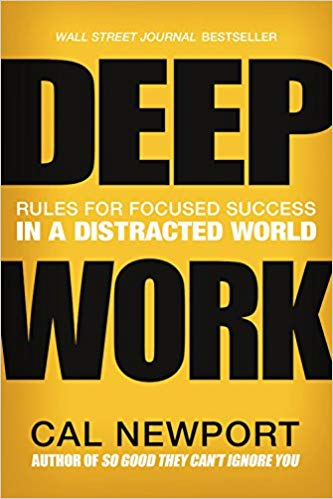The book has been written by Cal Newport, a professor at the Georgetown University (Washington D.C). He wrote about the importance of the focusing and concentration on the work, by increasing the limit of the time we usually allocate for it. The Author writes a lot of different use cases for great historical people (some of them are still alive), how they have been going deep into their work. Who used what kind of technique, and how the technique was mastered. While going through the book I have realized that all of these characters had some similar points and patterns. Concentration Technique !!!

Concentration (Focus)
Concentration is the key technique one should master in order to become a craftsman in his profession. There are many books, tutorials, and techniques to study the concentration. But in the end, everyone should find his own way of focusing on the topic. That is the key thing each of us individually must realize and model our own way of focusing.
We should not fall into an illusion of the idea that someday if you learn the concentration technique then done, you become a perfect man. No, it is the technique we should work on it every day, to improve it. We should think and plan on a daily bases, how could we optimize it more. Somehow I start deepening into another topic (sorry for that)
The quite interesting equation has been revealed in the book by the author:
High-Quality Work Produced = (Time Spent) x (Intensity of Focus)
The equation shows, if the (Intensity of Focus) is equal to 0, then produced result will be 0 too.
Decide on Your Depth Philosophy
Even though it wasn’t a chapter of the book, but I have found it as a key point of the book. Here I will list out the philosophies suggested by the author:
- The Monastic Philosophy of Deep Work Scheduling.
- The Bimodal Philosophy of Deep Work Scheduling
- The Rhythmic Philosophy of Deep Work Scheduling
- The Journalistic Philosophy of Deep Work Scheduling
The Monastic philosophy attempts to maximize deep efforts by eliminating or radically minimizing shallow obligations. Simply saying the practitioners of this philosophy tend to have a well-defined and highly valued professional goal. It becomes their ultimate life philosophy where anything except their work becomes secondary and they try to avoid shallow works at any cost. Even a small amount of shallow works are not allowed. Donald Knuth is the guy who belongs to this category. As he explains his professional goal as follows: “I try to learn certain areas of computer science exhaustively; then I try to digest that knowledge into a form that is accessible to people who don’t have time for such study.” As far as I know, it is impossible to reach Donald Knuth by email or any other SNS tools.
The Bimodal philosophy asks that you divide your time, dedicating some clearly defined stretches to deep pursuits and leaving the rest open to everything else. It is like a living a double life, something like Peter Parker and Spider-Man. During the deep time, the bimodal worker will act as monastically - seeking intense and uninterrupted concentration. During the shallow time, such a focus is not prioritized, just live an ordinary life like others. Carl Jung style of life is the best example for the bimodal philosophy. The books actually open up with Carl Jung’s story where his life and deep work style is described in short.
The Rhythmic philosophy argues that the easiest way to consistently start deep work sessions is to transform them into a simple regular habit. The goal is to generate a rhythm for this work that removes the need for you to invest energy in deciding if and when you are going to go deep. It is also called chain method and very popular among writers and fitness enthusiasts - communities that thrive on the ability to do hard things consistently.

Another common way to implement the rhythmic philosophy is to replace the visual aid of the chain method with visualization of the progress. Usage of the calendar could help to maintain visual indicators of your work progress.
The Journalistic Philosophy is the one considered as the difficult one among others. The reason is the person who applies this philosophy should be fit deep work wherever and whenever it is possible. People like Walter Isaacson, are trained to shift into a writing mode on a moment’s notice, as is required by the deadline-driven nature of their profession. Here what the John Paul Newport (journalist in New York) says about Walter Isaacson:
It was always amazing…he could retreat up to the bedroom for a while, when the rest of us were chilling on the patio or whatever, to work on his book…he’d go up for twenty minutes or an hour, we’d hear the typewriter pounding, then he’d come down as relaxed as the rest of us..the work never seemed to faze him, he just happily went up to work when he had the spare time
Isaacson was methodic: Any time he could find some free time, he would switch into a deep work mode and hammer away at his book.
Ritualizing is Important
The ritualization is another good habit. Author has noticed in his observations that those who use their minds to create valuable things is that they’re rarely haphazzard in their work habits. The meaning of haphazard from google says: lacking any obvious principle of organization. Right away he demonstrates it with few examples of some prize winning writers case. Where each of them were mostly organized. Even though till now I have been thinking the real writers and creative people are not organized. My father use to say “Творческий беспорядок”, which translates from Russian as “Creative Chaos”. But even in chaos there is an order, that is discussion for another time.
The journalist Mason Currey spent half a decade studying the habits of famous thinkers and writers. This is what he summarized:
There is a popular notion that artists work from inspiration - that there is some strike or bolt or bubling up of creative mojo from who knows where…but I hope my work makes clear that waiting for inspiration to strike is a terrible, terrible plan. In fact, perhaps the single best piece of advice I can offer to anyone trying to do creative work is to ignore inspiration
Through out the book the author brings the topic related to modern SNS (Facebook, twitter, etc) and how they affect to our deep work life. But he avoids inteligently to open the big topic for discussion. Of course we can feel he is personally not much big fan of those SNS and considers them as a disturbing tools. I can agree with him on that it is really big never ending discussion. Because even me myself personally inside still have controversial views, while I do understand the social networks are disturbing tools, but sometimes I can get really useful information which could actually affect my life (It could be IT blog, motivational speech or video). That is why as a conclusion everyone should realize for oneself at the proper time, is it needed or not. The balance is important.
Great creative minds think like artists but work like accountants
David Brooks